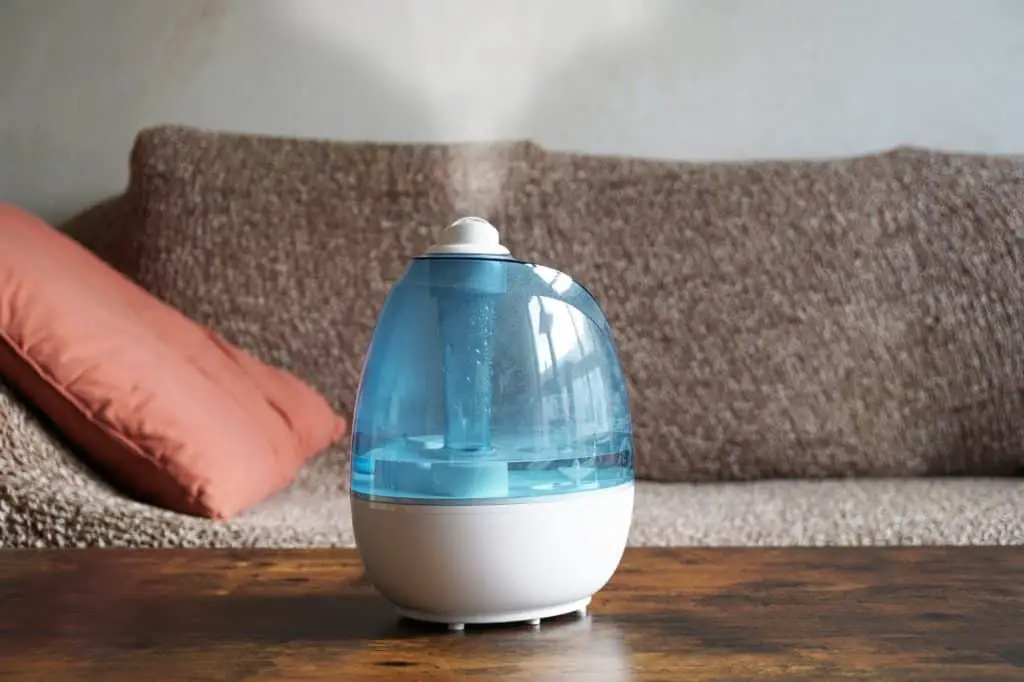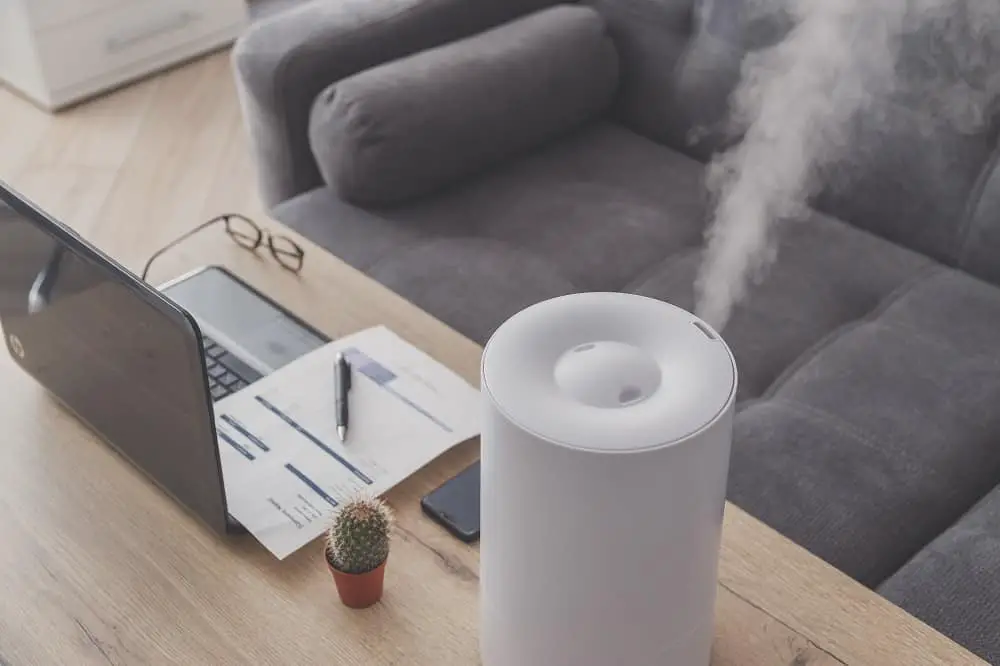According to Public Health Ontario, humidifiers can help prevent dryness that can irritate numerous parts of our bodies. Their use can be very soothing for people with asthma or other conditions such as dry skin, throat, nasal passages, and even those suffering from bronchitis and the flu. However, there are drawbacks to using humidifiers and places where they don’t belong.
The optimum humidity level for a room with a computer is between 35% to 55%. Humidifiers may be used next to or in the same room as a computer if the humidity is in this range. Humidity levels above this range may cause condensation inside the computer, leading to corrosion of parts and possible damage.
How Do You Measure Humidity?
Humidity is measured with a hygrometer. Dr. Nicolacakis recommends purchasing one to keep in your home for health reasons, which should also help ensure your computer runs properly.
Hygrometers are relatively inexpensive and you may find a selection sorted by average customer rating on Amazon here.
How Can Humidifiers Damage Computers?
Humidifiers that are not properly used can damage computers by creating too much moisture. NTS, which tests computer and other product performance under different temperature and humidity levels, says that “Humidity is the second leading environmental stressor affecting manufactured products.”
Humidity causes condensation, which corrodes metallic products, and fluctuations in humidity can cause contraction and expansion problems. Even worse, adds NTS, computers pull in dust, which is bad enough, but humidity can turn that dust “into a kind of pasty sludge,” causing even “more damage to sensitive parts.”
What Indoor Humidity Level Is Best for Computers?
Smart Fog, which focuses mostly on business computer rooms, says, “There’s really no easy answer to this question, as it depends on the exact type of computer and devices stored inside, as well as other environmental factors.”
However, it offers a safe relative humidity range of 30% – 40%, based on its recommendation that levels should be maintained to “allow for the greatest operational buffer in case of environmental support equipment down-time,” However, those levels are a bit lower than what others recommend.
“For optimal performance,” AV Tech recommends “maintaining ambient relative humidity levels between 45% and 55%” AV Tech also specializes in computer software and hardware that monitors computer rooms and data centers for issues like humidity and temperature that can harm operations. Techwalla differs from both in suggesting a humidity level not lower than 35%.
Can Low Humidity Levels Also Be a Problem for Computers?
According to Cybernet, When the air is too dry, there is just a “small danger” that this dryness can affect a computer. Even though it goes on to explain that humidity levels under 35% “significantly increase static electricity,” and, when the dry air combines with heat, this coupling of low humidity and high heat can cause “static discharges that can fry components and potentially harm users.”
Smartfog sees low humidity as a bigger issue. In fact, “the biggest environmental threat to computers.” Techwalla agrees with the need to keep the humidity level above 35%, explaining that static shock can destroy a computer, and “below 35 percent humidity, the risk worsens.” Armstrong International insists that “computer rooms must be humidified” to prevent damage from static electricity.
So this is why using a humidifier in the computer room, but not next to the computer, can be a good idea to increase moisture levels above 35%, so long as they are not misused to the point that they raise the levels to over 55%. Dr. Cheung recommends the Honeywell HCM350W Germ-Free Cool Mist Humidifier for raising the humidity level.
How to Lower Humidity
The Environmental Protection Agency recommends the following ways to reduce humidity levels in your home or other building.
- Increase ventilation. Note, this may not be helpful if the humidity outdoors is high.
- Vent the clothes dryers, bathrooms, and other sources of moisture to the outside.
- Whenever cooking, cleaning, or dishwashing, use exhaust fans.
- Use air conditioning. Central or window air conditioners dry indoor air, usually keeping humidity at a healthy and comfortable level.
- Use a dehumidifier. Note, these may be very helpful for use in basements and computer rooms, so long as they do not make the air too dry. They work by collecting excess moisture from the air, somewhat like how air conditioners work, but without cooling the air.
If you are now considering purchasing a humidifier, the following information explains what humidifiers are, the different types, what they are good for, and how they should be maintained.
What Are Humidifiers?
Humidifiers are devices used to increase moisture levels in the air inside homes or other buildings. They emit either water vapor or steam through various methods. There are five basic types, four of which are portable.

Portable Humidifiers
- Impeller produces a cool mist pumped into the air through a comb-like diffuser via a rotating disk.
- Evaporators use a fan blowing over a wick to produce a very fine, almost invisible mist. The fans can be noisy, and the wick must be regularly cleaned to avoid mold and bacteria overgrowth.
- Ultrasonic uses high-frequency sound vibrations to produce a cool mist and a fan for dispersing the mist. These have low noise but do require maintenance.
- Steam vaporizers use electricity to boil water and release it as steam, cooled to a warm mist. Because the heated water can cause burns, these are not advised for use near children.
Central Humidifiers
These are hard-wired into a home or building’s air conditioning and heating system and hooked up to the plumbing. They are designed to add moisture to the entire interior of the structure. These require proper filtration to avoid problems from the use of municipality water.
What Are Humidifiers Good For?
According to a Cleveland Clinic spokesperson, pulmonary specialist Kathrin Nicolacakis, MD, even people without any respiratory problems can suffer if the air is too dry. She says, “Your skin and nasal passages get dry, all the way down to your lungs,” which can cause you to wake up coughing.
Another specialist, board-certified dermatologist Jessie Cheung, MD, says that besides making breathing more comfortable, using a humidifier can also make your skin feel and look better by keeping it from drying out. Cheung also emphasizes that these can be needed in the summer, not just during the winter when the heated indoor air can get their driest.
Most experts recommend using filtered or distilled water in humidifiers to avoid adding microorganisms and minerals to the air.
What Indoor Humidity Levels Are Best for Human Health?
The Environmental Protection Agency recommends keeping the humidity level between 30%-60% to prevent mold growth, which it explains can be very damaging to human health. Health effects of mold exposure include asthma, allergic reactions, and other respiratory symptoms.
Too much humidity can make a building have stuffy air and cause condensation on surfaces, which can trigger the growth of molds, harmful bacteria, and dust mites. These allergens can trigger or exacerbate allergies and asthma symptoms and cause other respiratory problems.
According to the CDC website, the American Society of Heating and Air-Conditioning Engineers (ASHRAE) recommends keeping the humidity level below 65% for comfort. It is important to note that the lowest level recommended to prevent mold and bacteria growth is too low for preventing harm to computers from static electricity, based on information by several computer tech sources.
Final Thoughts
Humidifiers can help maintain an optimal humidity range for comfort, health, and computer efficiency. However, these devices should be used in rooms with computers only when humidity levels are below 35%.
Humidifiers should generally not be used next to or even close to a computer if produces humidity levels greater than 55%. This is due to the possibility of condensation of water on the computer parts, corroding, or damaging the computer in the process. It is far less costly to prevent this than to replace the computer.
Sources
- Public Health Ontario: Evidence Brief: Humidifier use in health care
- Mayo Clinic: Humidifiers: Air moisture eases skin, breathing symptoms
- NTS: Temperature & Humidity Testing | National Technical Systems
- Cybernet: How Do Industrial Computers Survive Extreme Heat, Cold, and Humidity?
- PCFIXIT: Is Humid Weather Bad for a Computer?
- US EPA: Ten Things You Should Know about Mold | Mold | US EPA
- Armstrong International: COMPUTER ROOM HUMDlFlCATlON
- Cleveland Clinic: Kathrin Nicolacakis, MD
- SmartFog: Humidity in Computer Rooms – What You Need to Know
- CDC: Indoor Environment Quality: Building Ventilation Resources
- Amazon: Honeywell-HCM350W-Germ-Humidifier-White

